|
|
|
Sort Order |
|
|
|
Items / Page
|
|
|
|
|
|
|
| Srl | Item |
| 1 |
ID:
150068


|
|
|
|
|
| Summary/Abstract |
Electricity sector has been transformed from state-owned monopolistic utilities to competitive markets with an aim to promote incentives for improving efficiency, reducing costs and increasing service quality to customers. One of the cardinal assumptions of the liberalized and competitive electricity markets is the rational actor, and decision-makers are assumed to make the best decisions that maximize their utility. However, a vast literature on behavioral economics has shown the weakness of economic theory in explaining and predicting individuals’ decision-making behavior. This issue is quite important for competition in electricity markets in which consumers’ preferences have a significant role. Despite its importance, this issue has almost been neglected in Turkey, which has taken major steps in electricity sector restructuring. Therefore, this paper aims to examine switching and demand response behavior in Turkish electricity market by using multiple correspondence and panel data analysis, and findings are discussed in light of the neoclassical and behavioral economics literature. Analyses’ results show that consumers’ switching and demand response behavior is consistent with the neoclassical literature to some extent; however, behavioral factors are also affecting consumers’ decisions. Furthermore, there are systemic problems that hinder effective functioning of the electricity market and restrict competition.
|
|
|
|
|
|
|
|
|
|
|
|
|
|
|
|
| 2 |
ID:
130994
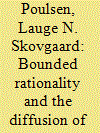

|
|
|
|
|
| Publication |
2014.
|
| Summary/Abstract |
Given the considerable sovereignty costs involved, the adoption of modern investment treaties by practically all developing countries presents somewhat of a puzzle. Based on a review of leading explanations of investment treaty diffusion, the article advances a new theory using behavioral economics insights on cognitive heuristics. In line with recent work on policy diffusion, it suggests that a bounded rationality framework has considerable potential to explain why, and how, developing countries have adopted modern investment treaties. To illustrate the potential of this approach, the case of South Africa is studied in depth.
|
|
|
|
|
|
|
|
|
|
|
|
|
|
|
|
| 3 |
ID:
162276
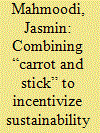

|
|
|
|
|
| Summary/Abstract |
Electrical utilities are a main stakeholder for achieving sustainable policy goals. Effective tariff designs that incentivize electricity savings among consumers can contribute to fulfilling these goals. Prior research suggests that penalties are more effective in promoting behavior change, which can be explained by insights from behavioral economics: Loss aversion describes that people react more strongly to losses (penalties) than to rewards of the same magnitude and go greater lengths to avoid them. However, in markets where consumers freely choose their preferred tariff, it remains a major challenge to persuade consumers to voluntarily subscribe to penalizing tariffs. The present study employed a choice experiment using choice-based conjoint analysis to examine consumer preferences for electricity tariffs that apply a combination of rewards and/or penalties for electricity consumption. Results from a representative sample of Swiss electricity consumers show that consumers prefer tariffs that reward decreases in electricity consumption, rather than tariffs that penalize increases in consumption, but that tariffs combining rewards and penalties achieve substantial potential market acceptance. Direct tariff attractiveness ratings additionally support these findings showing that consumers perceive combined Bonus-Malus tariffs as sufficiently attractive. Future research avenues and implications for marketing strategies and energy policies are discussed.
|
|
|
|
|
|
|
|
|
|
|
|
|
|
|
|
| 4 |
ID:
141815


|
|
|
|
|
| Summary/Abstract |
Behavioral economics has shown that people often diverge from classical assumptions about self-interested behavior: they have social preferences and are concerned about issues of fairness and reciprocity. Social psychologists show that these preferences vary across actors, with some displaying more prosocial value orientations than others. Integrating a laboratory bargaining experiment with original archival research on Anglo-French and Franco-German diplomacy during the interwar period, the authors show how fairness and reciprocity matter in social interactions. That prosocials do not exploit their bargaining leverage to the degree that proselfs do helps explain why some pairs of actors are better able to avoid bargaining failure than others. In the face of consistent egoism on the part of negotiating partners, however, prosocials engage in negative reciprocity and adopt the same behaviors as proselfs.
|
|
|
|
|
|
|
|
|
|
|
|
|
|
|
|
| 5 |
ID:
110872
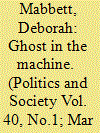

|
|
|
|
|
| Publication |
2012.
|
| Summary/Abstract |
The United States has introduced automatic enrollment into retirement savings schemes, and the United Kingdom is in the throes of doing so. The financial crisis has reminded us that returns on these schemes can be poor, even negative. Behavioral economics shows that people can be "nudged" into schemes regardless, but it also implies that the liberal account of market legitimation through informed choice cannot be applied. This article examines how risks are assigned in schemes and how enrollees might seek recourse if their expectations are disappointed. Comparing the United States and the United Kingdom, it argues that enrollees are more likely to seek recourse from the government in the United Kingdom. The explanation can be found in regulatory decisions that reflect the structure of each country's public pension scheme. This structure is conducive to private risk bearing in the United States, but not in the United Kingdom, suggesting that regulatory market liberalism is undermined by a residual approach to public provision.
|
|
|
|
|
|
|
|
|
|
|
|
|
|
|
|
| 6 |
ID:
143327


|
|
|
|
|
| Summary/Abstract |
The sunk costs fallacy is an important concept in the academic and policy worlds. It has helped explain consequential national security decisions such as the escalation in Vietnam and the surges in Iraq and Afghanistan. While previous analysis of sunk costs in international relations has made no distinction between financial and human sunk costs, there is evidence in psychology that people treat human lives and financial costs differently. The consensus in the casualty sensitivity literature is that human sunk costs should lower support for a conflict, but there is as yet no evidence on whether financial costs operate in the same way. Using the Environmental Protection Agency’s value of a statistical life to equalize human and financial costs, we create survey experiments through Mechanical Turk and GfK/Knowledge Networks about a hypothetical US military intervention to test if financial and human costs have the same effects on public opinion. We find that public reaction to sunk costs is contingent on the type of costs incurred. Consistent with the growing ‘sunk costs skeptic’ literature we find no evidence that any sunk costs induce greater commitment to a mission. Where the US contribution to the conflict is purely financial, sunk costs induce a desire to cut losses. When intervention involves US lives, sunk costs make no difference to the level of support. Finally, contrary to the implicit assumptions of past policymakers, ex ante levels of public support for sending troops and sending money are indistinguishable. These findings hold true both in situations involving high Iraq War level sunk costs and low Somalia-style costs.
|
|
|
|
|
|
|
|
|
|
|
|
|
|
|
|
| 7 |
ID:
150039


|
|
|
|
|
| Summary/Abstract |
Implicit discount rates (IDRs) are employed in energy models to capture household investment decisions, yet the factors behind the IDR and their respective implications for policy-making usually remain blurred and fractional. The proposed comprehensive framework distinguishes three broad categories of factors underlying the IDR for household adoption of energy-efficient technologies (EETs): preferences (notably over time, risk, loss, debt, and the environment), predictable (ir)rational behavior (bounded rationality, rational inattention, behavioral biases), and external barriers to energy efficiency. Existing empirical findings suggest that the factors underlying the IDRs that differ across household characteristics and technologies should be accounted for in energy models. Furthermore, the framework allows for a fresh look at the interplay of IDRs and policies. We argue that a simple observation of high IDRs (or observing correlations between IDRs and socio-economic characteristics) does not provide guidance for policy-making since the underlying sources cannot be identified. Instead, we propose that some of the factors underlying the IDR - notably external barriers - can be changed (through directed policy interventions) whereas other factors - notably preferences and predictable (ir)rational behavior - are innate and can only be taken into account (through reactive policy interventions).
|
|
|
|
|
|
|
|
|
|
|
|
|
|
|
|
| 8 |
ID:
153563
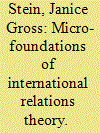

|
|
|
|
|
| Summary/Abstract |
Almost forty years ago, a small group of scholars drew on cognitive psychology to explain anomalous patterns of behavior by leaders on issues of international security. Although it made significant contributions to theory and research, that scholarship did not diffuse broadly into the field. Drawing on concepts in psychology and behavioral economics, research that uses new methods is now producing a wave of scholarship in international relations exemplified by the work in this special issue. Analysis of the use of prospect theory over the last three decades identifies the scope conditions that enable the predictions of rational choice and psychological theories. These scope conditions motivate the focus on the heterogeneity of decision makers that is at the core of current contributions. Future research will move beyond the now-sterile debate between rational choice and psychology.
|
|
|
|
|
|
|
|
|
|
|
|
|
|
|
|
| 9 |
ID:
177785
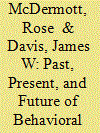

|
|
|
|
|
| Summary/Abstract |
Originally developed by applying models from cognitive psychology to the study of foreign policy decision making, the field of behavioral IR is undergoing important transformations. Building on a broader range of models, methods, and data from the fields of neuroscience, biology, and genetics, behavioral IR has moved beyond the staid debate between rational choice and psychology and instead investigates the plethora of mechanisms selected by evolution for solving adaptive problems. This opens new opportunities for collaboration between scholars informed by rational choice and behavioral insights. Examining the interactions between the individual's genetic inheritance, social environment, and downstream behavior of individuals and groups, the emerging field of behavioral epigenetics offers novel insights into the methodological problem of aggregation that has confounded efforts to apply behavioral findings to IR. In the first instance empirical, behavioral IR raises numerous normative and philosophical questions best answered in dialogue with political and legal theorists.
|
|
|
|
|
|
|
|
|
|
|
|
|
|
|
|
| 10 |
ID:
179138


|
|
|
|
|
| Summary/Abstract |
Behavioral economics, or “economics and psychology,” is an attempt to extend the explanatory power of economics by developing economic theory on more plausible psychological foundations.1 Most of its findings and applications pertain to decisionmaking under conditions of risk and uncertainty. There are two parts of the intelligence process to which an understanding of behavioral economics may be relevant: (1) the transactions and exchanges involved in agent recruitment and agent running, and (2) the task of prioritizing human intelligence (HUMINT) sources for interrogation. More generally, any prioritization task involving ranking or ordering is shaped systematically by the human decisionmaking process.
|
|
|
|
|
|
|
|
|
|
|
|
|
|
|
|
| 11 |
ID:
116521
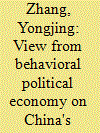

|
|
|
|
|
| Publication |
2012.
|
| Summary/Abstract |
A behavioral political economy framework is built on the basis of prospect theory to explain the induced and imposed institutional changes during China's market reform, giving special attention to the integrated effects of economic and political institutions. According to prospect theory, how rulers frame their decisions - in the prospects of gains or losses, influences how much risk they will take. China's market reform has been largely framed in the prospects of economic gains, for which the continuously growing private sector is the driving force. China's central government adopts a growth-oriented incremental reform that coincides with the prediction of prospect theory.
|
|
|
|
|
|
|
|
|
|
|
|
|
|
|
|
|
|
|
|
|